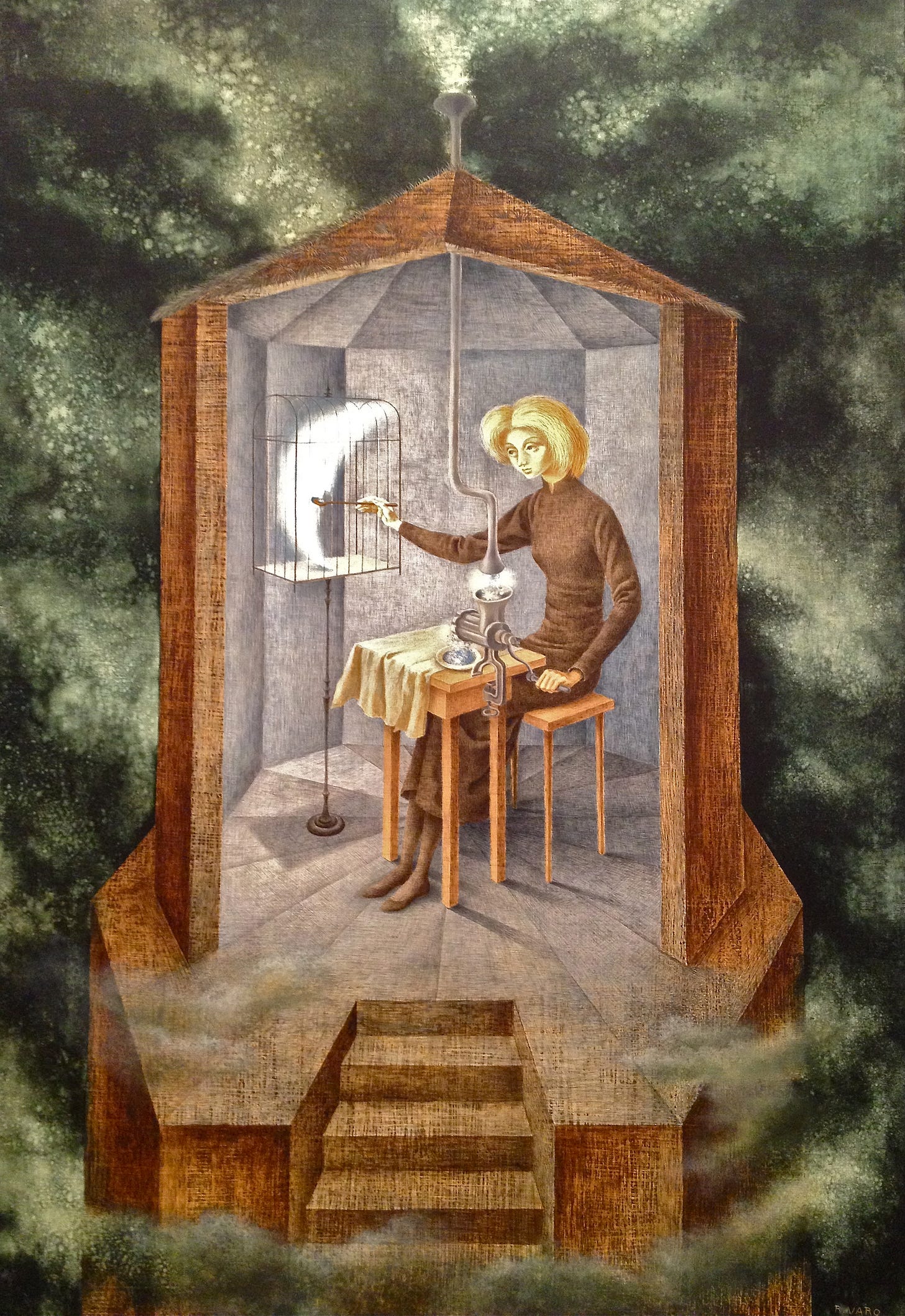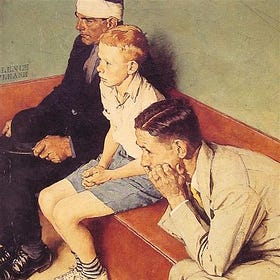A few weeks ago, I took the American Board of Surgery In Training Exam (ABSITE) — an exam that surgical residents take every year during our residency training. Each year, in the months before the exam, residents work themselves into a frenzy; in the work room, all that can be heard is ‘how many questions did you do last night?’ or, ‘did you hear that Andrew finished TrueLearn already?’
I hate it.
I love to learn, but I hate pointless academic exercises1 that impinge on my time and energy — inevitably, I end up feeling exhausted and burnt out.
But it did get me thinking about this idea of competence, and how one can know when it’s been reached.
The word comes from the Latin competentia which means meeting together, in agreement and symmetry. The word now means: the quality or state of having sufficient knowledge, judgment skill, or strength for a particular duty or in a particular respect.
But I like this word root we get from Latin: the idea that two things are meeting together and in symmetry. The two things, I like to think, are one’s expectation of a process or outcome, and the actual resultant process or outcome.
If I expect that I can do something, and I then successfully do it — that is competence.
But one might be successful at a task without being competent at it.

It was intern year; a surgical rapid response2 had just been called in the tower building. I rushed up to the room; you never know how much help you will have at a rapid — sometimes the entire surgical residency shows up, and sometimes everyone is in the OR and it’s just you.
Several residents were already in the room, so I stood by the door, pulling my chest in to make myself small, as I peeked over heads, trying to catch snippets of dialogue and see what was happening.
One of the senior residents saw me hovering, and put me to work.
“Shruti, can you get the ABG?” he asked.
I nodded, and pushed my way to the patient’s left side.
“Can I get a blood gas kit?” I asked no one in particular, hoping the nurses would hear the feigned authority in my voice and comply with my request. I was glad in this moment that our badges didn’t say ‘Intern’ on them.
The man’s arm was large, and his hand flopped about, resisting my attempts to extend his wrist. I quickly located a pulse, then took a deep breath.
I had never successfully performed an arterial stick before. I had tried — multiple times — always carefully preparing my supplies, practicing the techniques I had learned, but never getting that flash of bright arterial blood. The artery always eluded me, dancing around under the skin, taunting me as I incessantly poked the patient. It felt like the more I tried, the less likely it was that I would ever get it.
And this time, I had an audience.
45-degree angle. Steady the needle.
I advanced slowly, taking my time, shutting out the other voices and activity in the room.
And then, like magic, bright blood rushed out into the catheter, gushing into the collection tube.
“Got it.” I said.
I finished drawing up the blood, handed them to a nurse, and returned to my spot in the corner of the room. My chief nodded his approval as I walked by.
“Wow, that was pretty baller.” One of the other interns said. It was early in the year, and getting to do anything other than scut made for an excellent day.
My face felt warm, glowing in my small victory.
“Oh, you know... it was nothing.” I said, shrugging it off. But I couldn’t deny that in that moment, I did feel pretty baller.
I thanked my stars that luck had been on my side that day.
But now that I look back, I don’t know if luck had all that much to do with it. Each of my previous failed attempts had added to my skill, in some incremental, immeasurable way.
How many failed arterial sticks did I attempt before the one that succeeded? What was the critical number? And once I had done one, did that mean I was competent? My suspicion is that it didn’t — it would take many more to reach competence; but how many?
Since the early days of medicine, we’ve been coming up with ways to assess and teach competence.
See one, do one, teach one.
This is the oldest one – and I’ll confess, it’s my favorite. Its direct simplicity and bold verbiage encourage you to dive in.
But in order to “teach one,” you have to be sufficiently competent in your skills to not only perform a procedure, but also to recognize and fix any errors made in the process. And I don’t think doing “one” is enough for that.
Nowadays, metrics abound in graduate medical education: core competencies, mandated feedback, checklists, pillars of excellence, CME credits, certifications. Certainly, there is much to be said about how these initiatives have reduced medical error and improved other aspects of care delivery (see: The Checklist Manifesto by Atul Gawande).
But frankly?
I think a lot of it is just noise.
These checklists, competencies, feedback, pillars of excellence — are they really giving me, an individual resident, an accurate idea of what it means to be competent? If I complete a checklist saying I have done x amount of cholecystectomies, does that mean I’ve reached competence? Probably not. These measures are all necessary to ensure the quality of the workforce as a whole, but they’re not sufficient. Not on the individual level, anyways.
In 1960, three professors at NYU described four stages of competence in a textbook on business management. This was later described in an article as the “four levels of teaching,” and a few years later, as the “four stages of learning any skill.”
Whichever way it’s named, it has four components:
Unconscious incompetence
Conscious incompetence
Conscious competence
Unconscious competence

As a framework,3 these stages make sense: first, you don’t know that you don’t know something. Then, you know that you don’t know something. Then you attempt and practice the skill, and you’re exhibiting conscious competence.
But it is in the transition from conscious competence to unconscious competence — here is where the uncertainty lies.
Aside from a feeling in my gut, that I feel comfortable performing a procedure or dictating a patient care plan without needing to call for help, without needing reassurance from my seniors — aside from this feeling, I don’t know how to quantify this last step.
I have been thinking a lot about competence lately, as I will be returning to residency this July after two years away from the hospital on research and professional development time. I fear, often, that all of my knowledge has been sapped dry; that I will show up at the hospital and it will be just like July 1st of my intern year (only worse, because at least when I started intern year, I had just completed my 4th year medical school rotations in the hospital).
And so what will it take to be competent at something? To achieve competence as a surgeon?
I don’t have an answer right now. But I feel confident that thinking about this question, and constantly coming back to it, will help me find it.
Read previous essays from the archive:
The Collapse of a Life
In which I write about one of the worst deaths I ever had, breaking the news to the family, and how it has haunted me ever since.
The Waiting Room: A Short Story
A short story that follows a young couple experiencing the emotions that follow a difficult, life-changing choice. This story explores themes of autonomy, guilt, and isolation in a post-Roe world.
The purpose of the ABSITE is to predict whether you will pass the Board exams at the end of residency — to see how well you are accumulating knowledge as you progress through residency. Also, so much of the exam tests obscure and rarely seen conditions, non-general surgery topics, and granular biochemical facts, that it’s not a great indicator of how good a doctor you are, anyways.
A ‘rapid response’ is called when there is an acute change in a patient’s clinical condition — most commonly a concerning change in their vitals. It is a step down from ‘code blue.’ In some hospitals, medical and surgical rapid responses are separate — in others, one team responds to all rapids.
This article about ways to teach central line placement describes several different models of learning and skill development.








Write and at the same time save lives.
Ah I was just recollecting my days 1994 2nd year Medical student, 3 yr I opted/given gyneacology. Sweet days. Changed my carrer to safeguarding my country. Odd right. You keep up the good work..